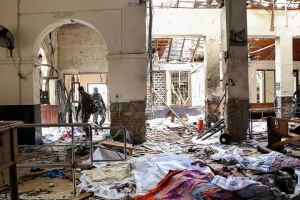Frankfurt, Brussels (10/3 – 57.14)
The situation in Tajikistan is particularly concerning, made worse given the impact of the COVID-19 pandemic and the recent increase in food prices due to the ongoing conflict in Ukraine. The combination of economic hardship and food insecurity is likely to exacerbate existing challenges related to poverty, civil unrest, and government corruption in Tajikistan.
The fact that more than 220,000 children in Tajikistan suffer from stunted growth is particularly worrying, as this is a clear indication of chronic malnutrition. Chronic malnutrition can have lifelong consequences, including impaired cognitive development, reduced productivity, and increased vulnerability to disease.
The risk of acute malnutrition among children under five years of age is also a major concern. Severe acute malnutrition can be life-threatening, and it is essential that adequate resources are provided to prevent and treat this condition. In addition to addressing the immediate needs of those affected by food insecurity and malnutrition, efforts should also be made to address the underlying causes of these problems, including poverty, unemployment, and corruption.
International organizations, including the United Nations and non-governmental organizations, are working to address the challenges facing Tajikistan. However, sustained investment and support will be necessary to ensure that the country is able to build a more stable and prosperous future for its citizens.
The Tajik medical system has been plagued by issues related to corruption and mismanagement, with the result that many people in Tajikistan are unable to access adequate healthcare. The COVID-19 pandemic has highlighted some of these issues, with reports suggesting that the government has been more focused on controlling information related to the pandemic than on addressing the actual health needs of the population. This has led to concerns that political considerations are taking precedence over medical ones, with potentially disastrous consequences for public health in Tajikistan.
The high cost of medical care and widespread corruption in the health sector make it difficult for many people to afford necessary treatments. This can lead to serious health consequences, particularly for those with chronic conditions such as cardiovascular diseases, diabetes, and cancer.
There are some government programs aimed at providing support to low-income families for healthcare expenses, but these programs are limited in scope and may not be sufficient to address the needs of all those in need. In addition, the government could take measures to reduce corruption in the health sector, such as improving transparency and accountability, and increasing resources allocated to healthcare.
International organizations such as the World Health Organization and non-governmental organizations are also working to improve healthcare access and quality in Tajikistan, particularly in rural areas where healthcare infrastructure is often inadequate. However, there is still much work to be done to ensure that all Tajiks have access to the medical care they need, regardless of their income level.
The Soviet-era system, which was free and relatively effective, is no longer in place. However, it is encouraging to hear that maternal and childcare has improved with the help of aid from organizations like USAID. It is important that efforts continue to be made to improve the overall health system and provide better access to healthcare for all citizens, regardless of their socioeconomic status.
In 2012, the London High Court ruled that Talco, which is owned by the Tajik government, was responsible for embezzling $1 billion between 2005 and 2008. The court found that Talco had transferred the money to offshore companies in the British Virgin Islands and Panama, and that the funds were then used to purchase luxury assets, including a private jet, a yacht, and properties in London and Dubai. The case was brought to court by the majority shareholder of Talco, who claimed that the company had been mismanaged and that its assets had been misappropriated.
Addressing the challenges related to food insecurity and malnutrition is essential to improving the well-being and prospects of the country’s population. Long-term solutions require sustainable development strategies, improved infrastructure, job creation, and diplomatic efforts to promote regional stability and cooperation.
Unfortunately, corruption is a significant problem in Tajikistan, affecting various sectors of society, including public administration bodies and public services. The police, customs, and tax authorities are among the most corrupt institutions, followed by the administration of universities and hospitals. Bribery and other forms of corruption are also widespread in the health sector, making it difficult for people to access affordable and quality healthcare. Addressing corruption is crucial for improving the country’s economic and social development.










